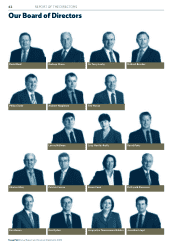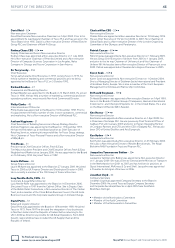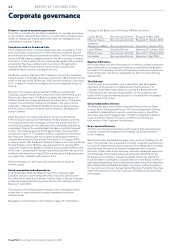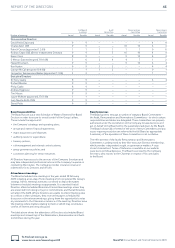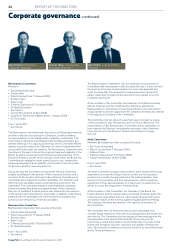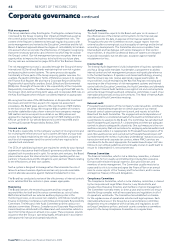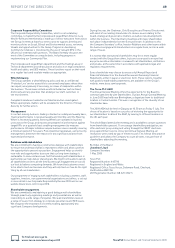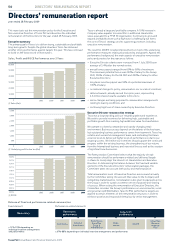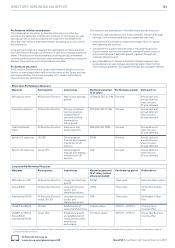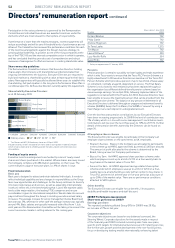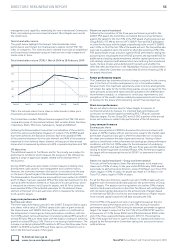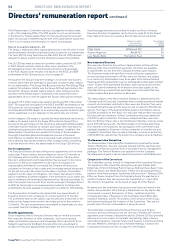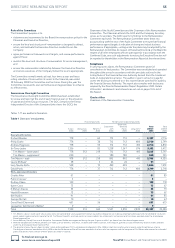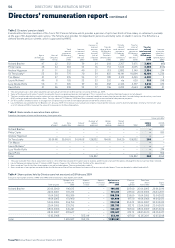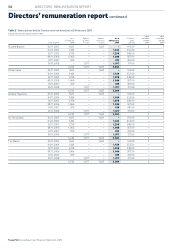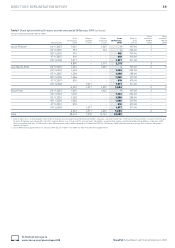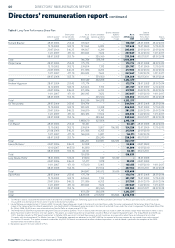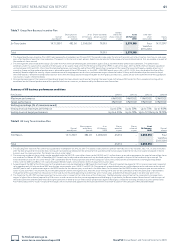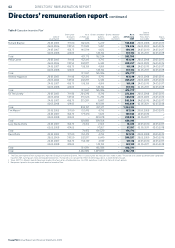Tesco 2009 Annual Report Download - page 54
Download and view the complete annual report
Please find page 54 of the 2009 Tesco annual report below. You can navigate through the pages in the report by either clicking on the pages listed below, or by using the keyword search tool below to find specific information within the annual report.
52 DIRECTORS’ REMUNERATION REPORT
Tesco PLC Annual Report and Financial Statements 2009
Directors’ remuneration report continued
Participation in the various elements is governed by the Remuneration
Committee and individual Executives are awarded incentives under the
elements which are most relevant to their sphere of responsibility.
If performance is lower than the maximum targets, incentive payments will
reduce accordingly and will be zero if threshold levels of performance are not
attained. The Committee has reviewed the performance conditions for each
of the incentive arrangements against the Group’s business strategy, its
growing global leadership, its position as one of the rising companies at the
top of the FTSE 100 and the intensely competitive sector in which it operates,
and has concluded that they provide a set of comprehensive and robust
measures of management’s effort and success in creating shareholder value.
Share ownership guidelines
The Remuneration Committee believes that Executive Directors holding
shares aligns their interests with shareholders and demonstrates their
ongoing commitment to the business. Executive Directors are required to
build and maintain a shareholding with a value at least equal to their basic
salary. New appointees will typically be allowed three years to establish this
shareholding. Full participation in the long-term Performance Share Plan is
conditional upon this. All Executive Directors currently satisfy this requirement.
Shares held by Executive Directors
as at 28 February 2009
0 1,000,000 2,000,000 3,000,000 4,000,000 5,000,000 6,000,000 7,000,000 8,000,000
Ordinary shares SIP LTIP EIP PSP
Richard Brasher
Philip Clarke
Andrew Higginson
Tim Mason*
Laurie Mcllwee
Lucy Neville-Rolfe
David Potts
Sir Te rry Leahy
* Tim Mason sold 631,384 ordinary shares on 22 April 2009.
Includes ordinary shares and awards of shares and nil cost options made to Directors
which remain subject only to a holding period. Excludes unexercised vested executive
share options.
Funding of equity awards
Executive incentive arrangements are funded by a mix of newly issued
shares and shares purchased in the market. Where shares are newly issued
the Company complies with ABI dilution guidelines on their issue. The
current dilution usage of executive plans is c.4% of shares in issue.
Fixed remuneration
Basic pay
Basic pay is designed to attract and retain talented individuals. It needs to
reflect individual capability and any changes in responsibilities as the Group
faces new opportunities and challenges. As the Group continues to diversify
into new product areas and services, as well as expanding internationally,
it seeks to reflect this in the benchmarking that is used. We examine salary
levels at the major retailers, the leading FTSE companies and ensure
consideration is given to international competitors. We also take into account
pay conditions throughout the Group in deciding executive annual salary
increases. The average increase for senior management below Board level
last year was 5%, whereas for other staff the average increase was typically
around 4%. Basic salaries are typically increased with effect from 1 July
each year and the Remuneration Committee will be taking into account the
current economic climate in setting salaries for the coming year.
Basic salary 1 July 2008
Director £000
Richard Brasher 792
Philip Clarke 792
Andrew Higginson 792
Sir Terry Leahy 1,375
Tim Mason 792
Laurie McIlwee* 550
Lucy Neville-Rolfe 554
David Potts 792
* Salary on appointment 27 January 2009.
Pensions
Pension provision is central to our ability to foster loyalty and retain experience
which is why Tesco wants to ensure that the Tesco PLC Pension Scheme is a
highly valued benefit. All Executive Directors are members of the Tesco PLC
Pension Scheme which provides a pension of up to two-thirds of base salary
on retirement, normally at age 60, dependent on service. The Final Salary
Scheme is now closed to new entrants but has been replaced throughout
the organisation by a different defined-benefit pension scheme based on
career average earnings. Since April 2006, following implementation of the
regulations contained within the Finance Act 2004, Executive Directors have
been eligible to receive the maximum pension that can be provided from the
registered pension scheme. The balance of any pension entitlement for all
Executive Directors is delivered through an unapproved retirement benefits
scheme (SURBS). Except for Tim Mason, the SURBS is ‘secured’ by using a
fixed charge over a cash deposit in a designated account.
Over the last few years pension contributions by our Executive Directors
have been increasing progressively. In 2008/9 the level of contribution was
7% of salary which is in line with senior management’s contribution levels.
Contributions will rise over the next three years to 10% by 2011/12. Further
details of the pension benefits earned by the Directors can be found on
page 56.
All employee share schemes
The Executive Directors are eligible to participate in the Company’s all
employee share schemes on the same terms as UK employees.
Shares In Success. Shares in the Company are allocated to participants •
in the scheme up to HMRC approved limits (currently £3,000 per annum).
The amount of profit allocated to the scheme is determined by the
Board, taking account of Company performance.
Buy as You Earn. An HMRC approved share purchase scheme under •
which employees invest up to a limit of £110 on a four-weekly basis to
buy shares at the market value in Tesco PLC.
Save as You Earn. An HMRC approved savings-related share option •
scheme under which employees save up to a limit of £250 on a four-
weekly basis via a bank/building society with an option to buy shares in
Tesco PLC at the end of a three-year or five-year period at a discount of
up to 20% of the market value. There are no performance conditions
attached to SAYE options.
Other benefits
The Executive Directors are eligible for car benefits, life assurance,
disability and health insurance and staff discount.
2008/9 Performance measurement
Short-term performance 2008/9
Earnings per share
The reported underlying diluted Group EPS for 2008/9 was 28.92p,
an increase of 7% on last year.
Corporate objectives
The corporate objectives are based on our balanced scorecard, the
Steering Wheel. Corporate objectives for the awards made in respect
of the financial year 2008/9 included increasing sales from new space;
specific profit targets for international businesses and for retailing services;
like-for-like sales growth and the development of the non-food business;
focus on developing trading models internationally; enhancing talent


